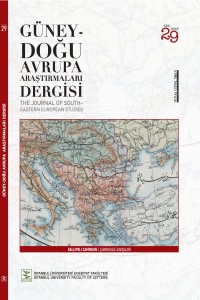Öz
1915 Çanakkale Seferi ve Sırbistan - İlişkiler, Önemi ve Sonuçları
Anahtar Kelimeler
Sırbistan Gelibolu Avusturya-Macaristan Osmanlı İmparatorluğu
Kaynakça
- Bjelajac, Mile. Serbia, in: 1914-1918-online. International Encyclopedia of the First World War, ed. by Ute Daniel, Peter Gatrell, Oliver Janz, Heather Jones, Jennifer Keene, Alan Kramer, and Bill Nasson, issued by Freie Universität Berlin, Berlin 2015-10-01. (DOI: http://dx.doi.org/10.15463/ie1418.10737)
- Dimitar Minchev, Participation of the population of Macedonia in the First World War 1914 – 1918, Sofia 2004.
- Dušica, Bojić. “Srpske izbeglice u Prvom svetskom ratu”, in: Prvi svetski rat i Balkan – 90 godina kasnije, Tematski zbornik radova. Institut za strategijska istraživanja, Belgrade 2010.
- Ljubomir Marić, “Valandovski zločin i njegove žrtve”, in: Ratnik IV (1930).
- Moorehead , Alan. Gallipoli, New York, 2002.
- Slobodan, Đukić. “Austrougarski ratni zarobljenici u Srbiji 1914-1915. godine”, in: Prvi svetski rat i Balkan – 90 godina kasnije, Tematski zbornik radova. Institut za strategijska istraživanja, Belgrade 2010.
- Stanislav Sretenović, Danilo Šarenac (eds.), Leksikon Prvog svetskog rata u Srbiji, Ratna dejstva oko Beograda, Institut za savremenu istoriju, Beograd 2015.
- Veliki rat Srbije za oslobođenje i ujedinjenje Srba, Hrvata i Slovenaca, Volume 8.
Öz
This paper represents an attempt to place Serbia in broader context of turbulent 1915 and its relations with Allied campaign at Gallipoli opposite to the usual interpretations and views of 1915 as year of long stalemate on the Balkan front. Although it is often observed as isolated event Gallipoli campaign was closely connected with events in the Southern and Southeast Europe. In that sense Serbia proved to be major obstacle for German and Austro-Hungarian attempts to establish land communication with their Ottoman ally. As fights on the Gallipoli intensified so did the Ottoman need for supplies. Despite the plans and wishes Central Powers were forced to postpone final showdown with Serbia. As long as Ottoman forces were pinned down defending the Straits they couldn’t be used against Serbia. Same rule applied for Austro-Hungarian forces when Italy entered a war on the side of the Entente. Balkan neutral countries: Bulgaria, Greece and Romania were carefully observing situation choosing the right moment to join the fight. On which side they would fight depended on will and possibilities of the major European powers to fulfill their territorial demands. At the end Germans involved after they managed to achieve victory on the Easter front and redeploy their elite forces to Balkans. Ottoman victory at the Gallipoli “bleed out” the Western Allies to the extent that they couldn’t commit enough forces to assist Serbia when in October 1915 began joint German-Austro-Hungarian-Bulgarian offensive resulting in temporary defeat of Serbia.
Anahtar Kelimeler
Serbia Allies Gallipoli Austria-Hungary Bulgaria Ottoman Empire.
Kaynakça
- Bjelajac, Mile. Serbia, in: 1914-1918-online. International Encyclopedia of the First World War, ed. by Ute Daniel, Peter Gatrell, Oliver Janz, Heather Jones, Jennifer Keene, Alan Kramer, and Bill Nasson, issued by Freie Universität Berlin, Berlin 2015-10-01. (DOI: http://dx.doi.org/10.15463/ie1418.10737)
- Dimitar Minchev, Participation of the population of Macedonia in the First World War 1914 – 1918, Sofia 2004.
- Dušica, Bojić. “Srpske izbeglice u Prvom svetskom ratu”, in: Prvi svetski rat i Balkan – 90 godina kasnije, Tematski zbornik radova. Institut za strategijska istraživanja, Belgrade 2010.
- Ljubomir Marić, “Valandovski zločin i njegove žrtve”, in: Ratnik IV (1930).
- Moorehead , Alan. Gallipoli, New York, 2002.
- Slobodan, Đukić. “Austrougarski ratni zarobljenici u Srbiji 1914-1915. godine”, in: Prvi svetski rat i Balkan – 90 godina kasnije, Tematski zbornik radova. Institut za strategijska istraživanja, Belgrade 2010.
- Stanislav Sretenović, Danilo Šarenac (eds.), Leksikon Prvog svetskog rata u Srbiji, Ratna dejstva oko Beograda, Institut za savremenu istoriju, Beograd 2015.
- Veliki rat Srbije za oslobođenje i ujedinjenje Srba, Hrvata i Slovenaca, Volume 8.
Ayrıntılar
| Birincil Dil | İngilizce |
|---|---|
| Bölüm | Araştırma Makalesi |
| Yazarlar | |
| Yayımlanma Tarihi | 30 Haziran 2016 |
| Yayımlandığı Sayı | Yıl 2016 Sayı: 29 |


